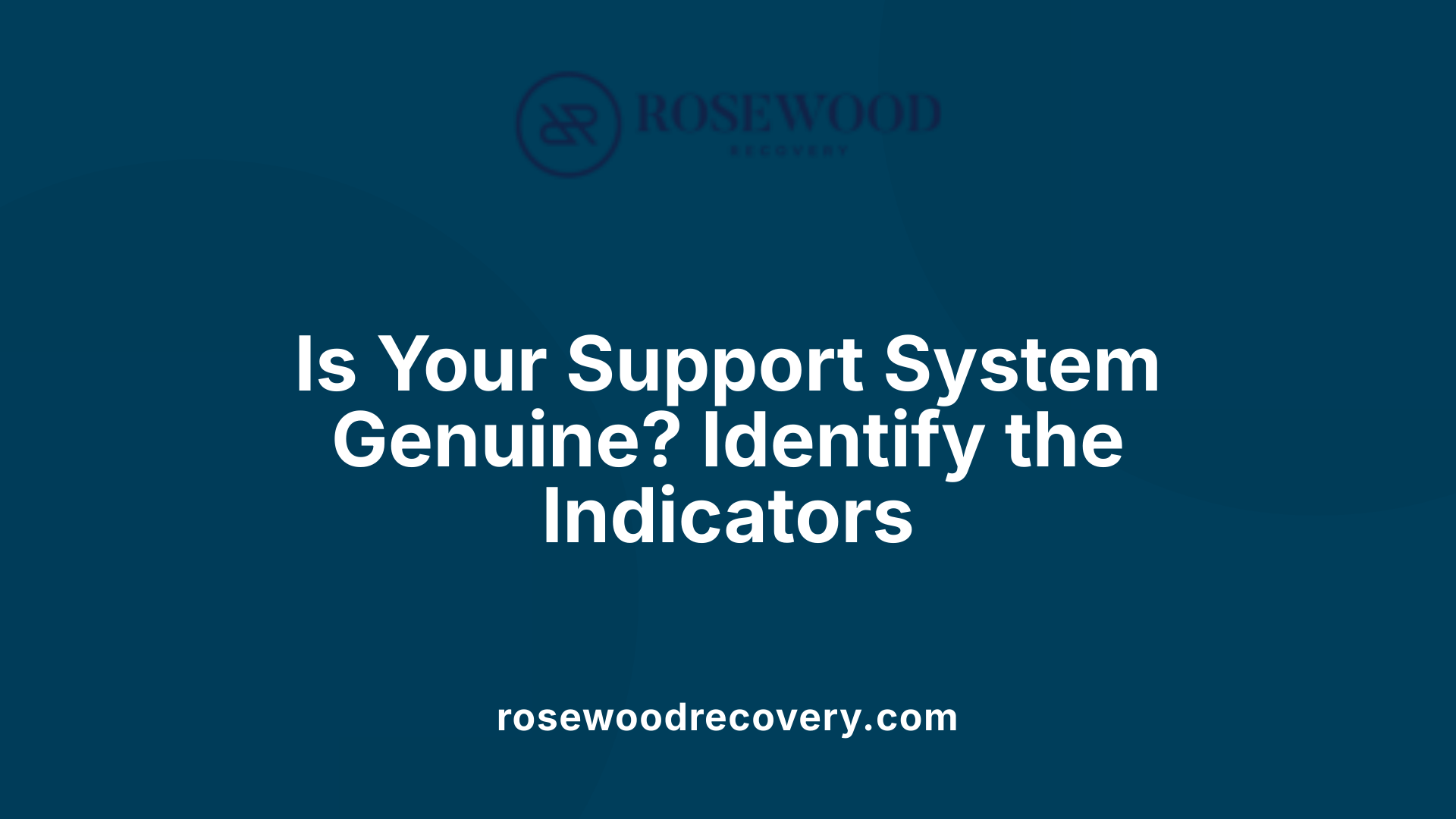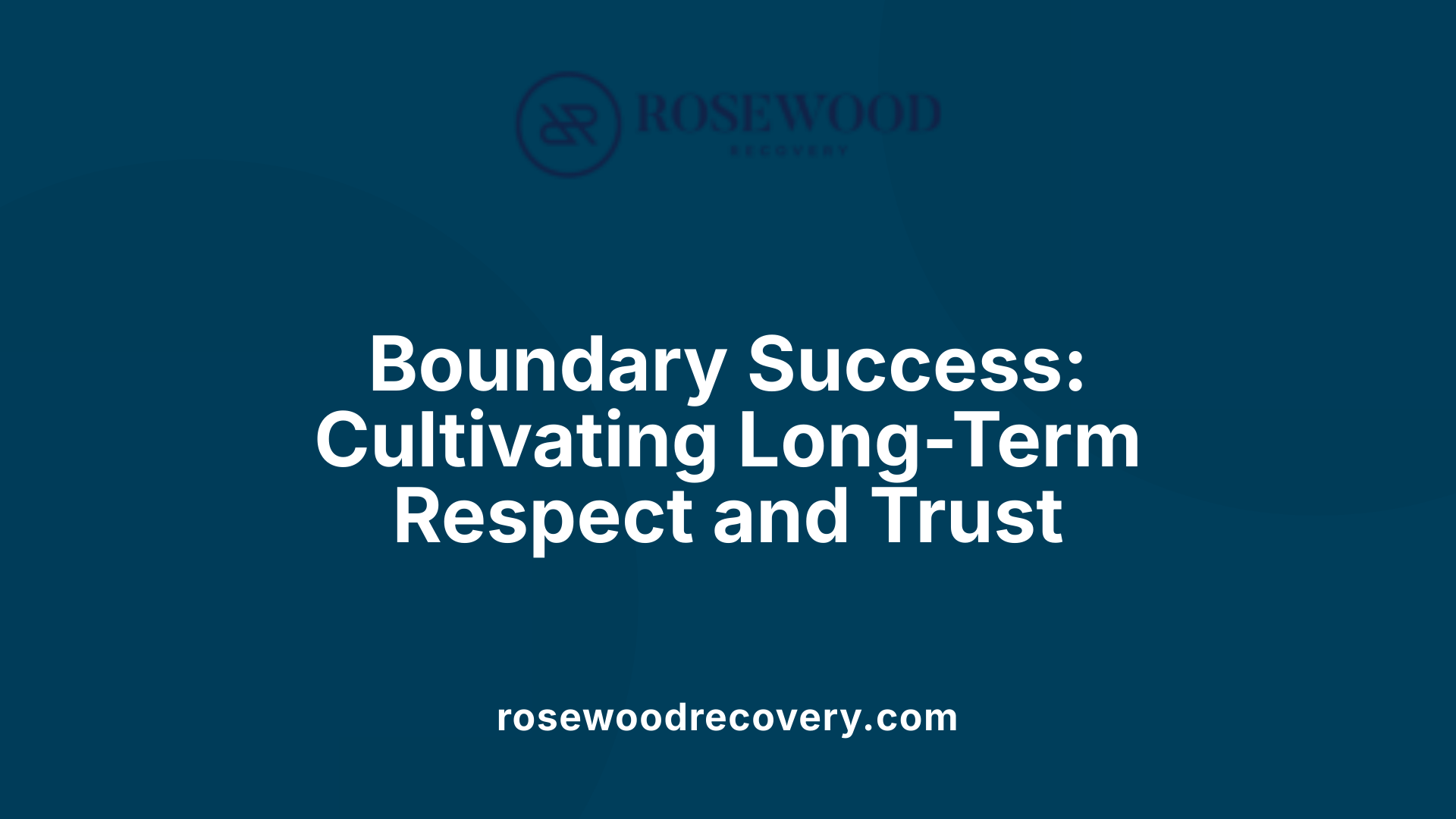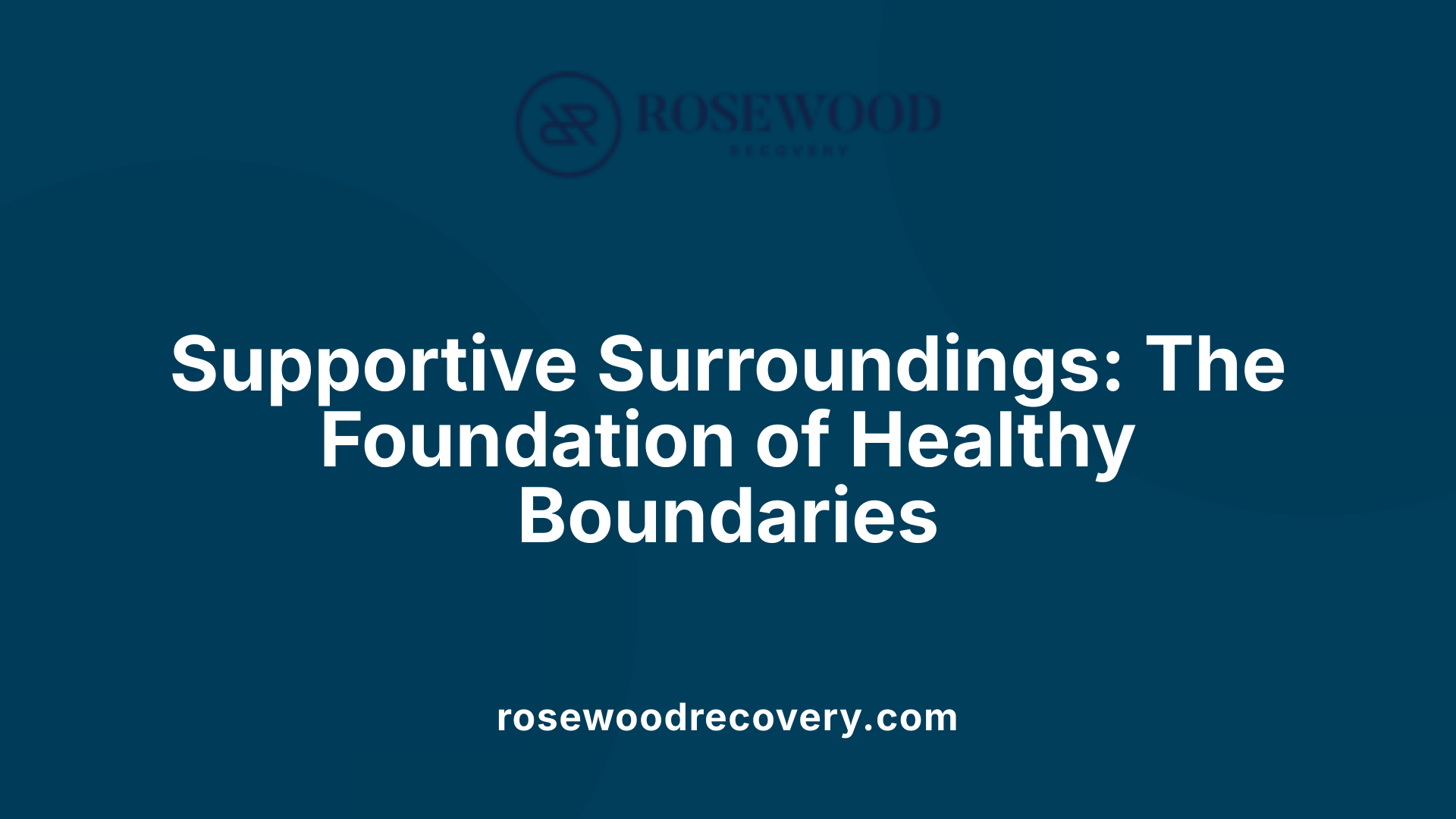Understanding the Importance of Emotional Boundaries
In the complex landscape of personal relationships, especially with peers, establishing and maintaining healthy boundaries is essential for emotional well-being. Boundaries serve as vital tools to protect oneself from harmful behaviors and to foster respectful, authentic connections. This article explores practical strategies for recognizing unsupportive behavior, setting effective boundaries, and responding with empathy, all aimed at preserving your mental health and nurturing healthier interactions.
Recognizing Signs of Unsupportive Peers and Family Members
 Understanding the behaviors of those who may not offer genuine support can help you identify unhealthy relationships early on.
Understanding the behaviors of those who may not offer genuine support can help you identify unhealthy relationships early on.
One prominent sign is dismissiveness and invalidation. When peers or family members consistently downplay your feelings or treat your emotions as unimportant, it can undermine your confidence and sense of worth.
Lack of enthusiasm or interest is another indicator. If they show little to no excitement for your achievements, goals, or even everyday struggles, it suggests a detachment from your well-being.
Undermining efforts and boundary-setting behaviors reveal a lack of respect. When someone frequently dismisses your boundaries or interferes with your personal limits, it can create a hostile environment that hampers your personal growth.
Manipulative or controlling tendencies are signs of deeper issues. These individuals might attempt to influence your decisions or restrict your independence, often under the guise of caring.
Poor communication and emotional disregard also characterize unsupportive relationships. They may interrupt, talk over you, or refuse to listen, signaling a lack of genuine respect and empathy.
| Sign of Unsupportive Behavior | Description | Impact |
|---|---|---|
| Dismissiveness | Minimizing feelings or opinions | Erodes self-esteem |
| Lack of interest | No enthusiasm for your success | Creates emotional distance |
| Undermining boundaries | Ignoring personal limits | Feels controlling or invasive |
| Manipulation | Influencing decisions unfairly | Reduces autonomy |
| Poor communication | Interrupting or avoiding dialogue | Hinders understanding |
If you notice these signs, it may be time to reevaluate the relationship. Healthy bonds are built on mutual respect, support, and effective communication, which these behaviors threaten.
Identifying Your Personal Boundaries and Triggers
Understanding different types of boundaries (emotional, physical, etc.)
Boundaries come in various forms, each protecting distinct parts of our well-being. Physical boundaries relate to personal space and bodily autonomy. Emotional boundaries involve managing feelings and reactions, ensuring you don't become overwhelmed or enmeshed in others' emotions. Intellectual boundaries safeguard your thoughts and beliefs, while sexual, financial, communication, time, and psychological boundaries each serve specialized protective roles.
Recognizing personal limits and emotional triggers
To accurately identify your boundaries, pay attention to situations that evoke discomfort, resentment, or stress. These reactions often signal where your limits lie. For example, if you feel drained after certain interactions, it may point to emotional or communication boundaries needing reinforcement.
Aligning boundaries with values and well-being
Setting boundaries is a reflection of your core values and what you need to maintain health and happiness. Establish personal rules that align with your beliefs, limits, and core needs. For example, if honesty is a value, an emotional boundary might involve being honest about your feelings while also respecting others'.
The importance of self-awareness in boundary setting
Self-awareness helps you recognize your emotional triggers and understand what makes you feel secure or unsafe. Techniques like journaling, mindfulness, and regular self-reflection can clarify your boundaries and guides your actions. When you know your limits, you can communicate them confidently and protect your mental and physical health.
How can I establish and maintain emotional boundaries with unsupportive peers?
If you find yourself dealing with peers who don't support your emotional needs, start by clearly identifying your limits and triggers. Use assertive "I" statements, such as, "I need to step back if conversations become too personal," and communicate these clearly. Restate your boundaries regularly and set consequences if they are ignored. Incorporate self-care practices like journaling or talking with supportive friends to boost resilience. Remember, boundary-setting is an ongoing process that helps maintain autonomy and mental health, even in challenging interactions.
Effective Communication Strategies for Boundaries
How can I establish and maintain emotional boundaries with unsupportive peers?
Establishing and maintaining emotional boundaries is crucial when dealing with peers who may not always support your needs. The first step is to recognize your own emotional limits and identify what triggers feelings of discomfort or overwhelm. This self-awareness allows you to pinpoint where boundaries are necessary.
When communicating these boundaries, use clear, respectful language anchored in "I" statements. For example, saying "I feel overwhelmed when discussions become too negative, and I need to take a step back" assertively conveys your needs without blaming others.
Timing and tone are vital. Choose moments when you are calm and receptive for conversations about boundaries, and maintain a respectful, composed tone. This helps your message come across more effectively and fosters mutual understanding.
Consistency is essential in reinforcing boundaries. Restate your limits when needed and clearly communicate the consequences if boundaries are crossed, such as needing to limit interaction or change the nature of your engagement.
Remaining open to feedback and adaptable changes is also beneficial. As circumstances evolve, your boundaries might need adjustments, so stay flexible.
Building resilience is supported through grounding techniques, self-care activities like journaling, or talking to trusted friends. These practices help reinforce your emotional well-being.
Remember, setting boundaries is an ongoing process. It helps preserve your mental health, builds autonomy, and reduces resentment, creating healthier interactions with others.
Handling Resistance and Boundary Violations
Recognizing resistance and boundary breaches
Understanding when boundaries are challenged is an essential first step. Resistance to boundaries can manifest as defensiveness, guilt, or attempts to push past the limits you've set. Similarly, violations may include actions that disregard your expressed needs or feelings. Developing awareness of these signs helps you respond effectively, ensuring your well-being remains protected.
Strategies for reinforcement and assertiveness
Strengthening boundaries involves clear, consistent communication. When a boundary is crossed, address it promptly with direct language, using 'I' statements to express how certain behaviors affect you. Practicing assertiveness allows you to stand firm without aggression, supporting your emotional safety.
Using consequences and maintaining firmness
Enforcing boundaries sometimes means implementing consequences if breaches continue. These might include reducing contact or re-evaluating the relationship. Consistency is important; if you set a boundary, follow through to reinforce its importance. Staying firm in your stance shows that your limits are non-negotiable.
Dealing with discomfort and potential conflict
Setting boundaries often provokes discomfort, especially when confronting resistant individuals. Remind yourself of the reasons boundaries matter, such as protecting your mental health. Preparing for potential pushback can ease anxiety; plan responses to common objections. Remember to prioritize self-care during this process, and seek support if necessary. Over time, practicing boundary-setting in low-stakes situations helps build confidence and reduces discomfort.
Understanding the Motivations Behind Unsupportive Behavior
When someone acts unsupportively, it can be easy to interpret their actions as personal or intentional. However, exploring the motivations behind such behavior reveals that it often stems from deeper issues like insecurity, fear, or a lack of awareness.
Insecurity can cause individuals to act defensively or dismissively because they feel threatened or uncertain about themselves. Fear might lead people to avoid supporting others if they worry about their own shortcomings or comparisons. Lack of awareness indicates that they may not even recognize how their actions affect others or how to show support appropriately.
Recognizing that these actions come from personal struggles rather than malicious intent helps in responding effectively. It allows you to approach the situation with empathy and patience, instead of reacting with frustration or blame. For example, understanding that a dismissive remark might be rooted in their own insecurity encourages you to set clear boundaries while maintaining compassion.
Fostering empathy and patience is essential when handling unsupportive behavior. Instead of taking such actions personally, you can choose to communicate openly or calmly address the issue, which can lead to more constructive interactions.
Avoiding blame and fostering understanding also involve recognizing that everyone has limits. Creating boundaries for your emotional well-being is vital—especially when others’ actions threaten your mental health. Setting these boundaries isn’t about distance or rejection but about protecting yourself, which aligns with the healthy practice of establishing personal rules rooted in your values and limits.
Ultimately, grasping the underlying reasons behind unsupportive actions helps you respond in ways that support your needs without escalating conflicts. It nurtures healthier relationships and promotes mutual respect. Remember, boundaries are a form of self-care, not a reflection of love for others. They empower you to maintain your well-being while navigating complex interactions.
The Role of Self-Care and Grounding Techniques
Setting boundaries is an important part of maintaining your well-being and fostering healthy relationships. To navigate boundary-setting effectively, especially when it involves uncomfortable feelings, self-care plays a crucial role.
Importance of Self-Care in Boundary Setting
Establishing and enforcing boundaries can be emotionally taxing, particularly if you're unaccustomed to doing so. Self-care helps reinforce your resilience by ensuring you are physically, emotionally, and mentally prepared for the discomfort that might come with asserting your limits. It involves activities that nurture your well-being, like relaxing routines, adequate rest, and mindfulness practices. By prioritizing self-care, you are better equipped to handle pushback or resistance from others and maintain your sense of self.
Grounding Exercises to Manage Discomfort
When setting boundaries, feelings of anxiety or discomfort may surface. Grounding techniques are practical exercises that help anchor you in the present moment. These can include deep breathing, focusing on your senses (noticing five things you see, four you hear, three you feel, etc.), or physical activities like stretching. These exercises calm the nervous system, diminish feelings of overwhelm, and give you the mental clarity needed to stand firm in your boundaries.
Maintaining Emotional Resilience
Building emotional resilience involves regularly practicing self-care and grounding methods, as well as adopting a mindset that views discomfort as a temporary and necessary part of growth. Reminding yourself of the benefits of setting boundaries—such as increased safety, authenticity, and peace—can motivate you to persevere through challenging moments. Over time, consistent practice strengthens your capacity to maintain boundaries, even in difficult situations.
Here’s a simplified overview of strategies for effective boundary setting:
| Strategy | Description | Benefit |
|---|---|---|
| Clear Communication | Express boundaries directly and calmly. | Helps others understand your limits. |
| Self-Care Practices | Engage in activities that restore your energy and reduce stress. | Builds resilience and reduces anxiety. |
| Grounding Exercises | Use mindfulness or physical activities to stay present when uncomfortable feelings arise. | Provides immediate relief and mental clarity. |
| Planning for Resistance | Have responses prepared for pushback or difficulty in enforcing boundaries. | Empowers you to stay firm and confident. |
Remember, setting boundaries isn’t about rejecting others, but about protecting your well-being. Embracing these techniques can help you feel more secure and authentic in your relationships.
Adopting a Long-Term Perspective for Boundary Maintenance

Why is consistency important when enforcing boundaries?
Maintaining boundaries over time requires consistent application. When boundaries are set, whether physical, emotional, or related to other aspects of well-being, regular reinforcement helps others understand and respect these limits. Consistency fosters trust and reliability, signaling that your boundaries are non-negotiable and part of your personal identity.
How can boundaries be adjusted as relationships develop?
Relationships evolve, and so should boundaries. As you grow and circumstances change, reviewing and refining your boundaries ensures they continue to serve your well-being. This might mean strengthening some boundaries or relaxing others, always aligned with your values and comfort. Open communication about these updates can help partners or friends understand your needs and support your growth.
Why are patience and persistence vital in boundary setting?
Changing habits or reactions—both for yourself and others—takes time. When initially enforcing boundaries, resistance or discomfort might occur. Patience and persistence are essential to navigate these challenges and establish new patterns. Remembering the long-term benefits encourages you to stay committed despite difficulties.
What are the long-term benefits of maintaining healthy boundaries?
Consistently upholding boundaries enhances your emotional safety and promotes authentic interactions. Over time, this leads to healthier relationships, greater self-respect, and improved mental health. Boundaries help you preserve your values while fostering respect from others, contributing to a more balanced and fulfilling life.
How does understanding the motives behind unsupportive behavior improve boundary responses?
Knowing that others' unsupportive actions often originate from their own insecurities or fears helps foster empathy. This understanding reduces blame and allows for responses grounded in patience and clear communication. Recognizing underlying motives enables you to set boundaries effectively, focusing on protecting your well-being without escalating conflicts.
| Aspect | Focus | Additional Details |
|---|---|---|
| Enforcement | Consistency in application | Reinforces respect and trust |
| Flexibility | Adjust boundaries as needed | Reflects personal growth and relationship changes |
| Patience | Persist through resistance | Ensures long-term success |
| Benefits | Improved relationships | Greater self-respect and mental health |
| Motivation | Understand others’ motives | Promote empathy and effective responses |
Creating a Supportive Environment for Boundary Effectiveness
 Building a supportive environment is essential when establishing and maintaining boundaries. Surrounding yourself with understanding individuals can make this process easier and more sustainable.
Building a supportive environment is essential when establishing and maintaining boundaries. Surrounding yourself with understanding individuals can make this process easier and more sustainable.
Seeking support from confident friends or mentors who respect your boundaries provides reassurance and encouragement. These trusted individuals can act as sounding boards, help you stay accountable, and offer advice based on their own experiences.
Developing a network of people who understand the importance of boundaries allows you to share your experiences and learn from others. Discussing challenges and successes can boost your confidence and provide new strategies for boundary-setting.
Sharing your boundary experiences and listening to others' stories fosters a sense of community and normalizes the process. This mutual understanding reduces feelings of isolation or guilt.
If needed, seeking professional guidance, such as therapists or counselors, can provide personalized support. These experts can help you clarify your boundaries, work through resistance, and develop healthy communication strategies.
By creating a space where integrity around boundaries is valued, you strengthen your ability to stand firm in your personal rules. Remember, understanding the motivations behind unsupportive behavior helps you respond with empathy, patience, and clarity. Recognizing that such actions often stem from others' insecurities or fears — rather than malice — enables you to set boundaries without guilt and focus on your well-being.
Establishing a supportive environment ultimately empowers you to protect your mental health and build stronger, more authentic relationships.
Empowering Yourself for Healthier Relationships
Setting emotional boundaries with unsupportive peers is an ongoing process that requires self-awareness, assertive communication, and resilience. Recognizing the signs of unsupportive behavior and understanding its underlying causes can foster empathy and patience. Consistent enforcement of boundaries, coupled with self-care and grounding techniques, helps to maintain emotional well-being. By building a support network of understanding individuals and adopting a long-term perspective, you can enhance your ability to navigate complex relationships. Ultimately, cultivating healthy boundaries empowers you to protect your mental health, foster respect, and develop more authentic, supportive connections.
References
- How to set boundaries after being scapegoated
- Struggling to Set Boundaries With Friends? Try This - Terri Cole
- Setting Boundaries with Friends: The How, When, and Why - Joon
- How to Set Healthy Boundaries & Build Positive Relationships
- #496 – Setting Boundaries in Friendship | Chrystal Evans Hurst
- Boundaries And Mental Health: How To Set Boundaries With Friends
- Signs of Unsupportive Friends: How to Spot and Deal with Toxic ...
- Dealing With Unsupportive Family: 4 Key Strategies (+tips)

.jpeg)
.jpeg)

